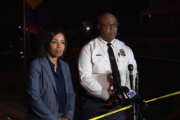Before applying to colleges, Justin Pierce thoroughly researched schools to identify institutions with comprehensive services that could cater to his visual impairment. He says DePaul University in Illinois stood out and was his top choice for its proactive approach to supporting students with disabilities.
“I chose DePaul primarily for its inclusive atmosphere, which fostered a sense of belonging that I hadn’t experienced elsewhere,” says Pierce, who graduated in 2022 with a Bachelor of Arts degree in organizational communications.
He says the school’s Center for Students with Disabilities provided invaluable support through a dedicated learning specialist who helped him navigate accessibility challenges, such as proactively communicating with professors, plus “advocating for testing accommodations and facilitating connections with sighted classmates when needed.”
Finding a college that meets accommodation needs is important for the success of some students. Here are some things students with disabilities should know and what to look for when researching colleges.
Know Your Rights
The Americans with Disabilities Act of 1990 requires that colleges and universities provide reasonable accommodations. Section 504 of the Rehabilitation Act of 1973 requires colleges and universities that receive federal financial funds to provide modifications or accommodations to ensure that students with disabilities are not excluded.
“Both laws protect students from discrimination on the basis of disability,” says Annie Tulkin, founder and director of Accessible College, which focuses on college preparation and transition for students with physical disabilities and health conditions.
Such students should begin the college application process by first meeting with their high school counselor “and their 504 or Individualized Education Programs teams and decide what accommodations they’ll need in college, and ensure that any evaluations regarding their disability and other documentation is current,” says Gregory A. Moorehead, director of the Center for Students with Disabilities at DePaul University.
[How to Navigate College Admissions With a Learning Disability]
He encourages this first step because the process for higher education is unlike K-12, where the law requires educational administrators to seek out students with disabilities to ensure their needs are met.
“In higher education, it’s on the student to make sure they are connecting with the designated disability support office to disclose their needs and provide any required documentation to support their request for accommodations,” Moorehead says.
For example, Tulkin says personal aides and services, such as a personal care attendant, are not provided in college. “In college, students need to be prepared to self-advocate,” she says. “If students want to receive accommodations in college, they have to self-disclose their disability and provide documentation to the disability support office.”
Connect With Disability Services
Students should contact a prospective school’s disability services office early to learn about available accommodations.
“Colleges vary in the types of accommodations they provide and the way in which they provide the accommodations,” Tulkin says.
Rob Stahl, executive director of Student Health Services and chief health and wellness officer at Hofstra University in New York, says a school should have a dedicated disability support services office with appropriate resources to provide necessary accommodations.
He says the presence of an accessibility services office or staff for disability services “is a key indicator of how seriously a university takes accommodations” and that responsiveness, resources and support can vary across institutions.
Moorehead echos that some offices might have additional resources that can be critical to a student’s success. “I highly recommend for students to talk with a university’s disability services office before they commit to a university,” he says.
DePaul has learning and education support specialists who work with students one on one, including staff who work with students on the autism spectrum to help them develop social skills, he says.
Check Physical Accessibility
Not all campuses may meet your standards for physical accessibility, so it’s important to do your research. Tulkin suggests considering the physical layout of the campus and the weather.
Stahl advises checking to ensure that campus buildings are physically accessible with features such as ramps, elevators and accessible classrooms and restrooms.
Moorehead also recommends that prospective students “ask universities they are interested in how accommodations might differ depending on their particular individual needs.”
[READ: How to Navigate College as a Neurodivergent Student.]
Ask About the Range of Services Provided
Many schools provide services to fit a disabled student’s needs, like priority registration, recording of class lectures, use of a calculator, enlarged texts, audiobooks, extra time for assignments, sign language services or captioning, alternative testing procedures and a reduced-distraction room for testing.
“Investigate the range of services offered, such as note-taking assistance, extended time for exams, alternative formats for course materials and assistive technology,” Stahl says.
Moorehead suggests students ask about accommodations based on the academic program a student is in, since “accommodations needed for an English major might differ from those needed for a science or medicine major.”
Flexible academic scheduling is also something to look for, Moorehead adds, or the option for part-time study. He says it’s also important to look at course delivery options such as online, hybrid and in-person classes that accommodate different needs.
“Inquire about accommodations for special housing needs, such as accessible room setups or the ability to have a service animal in residence,” Stahl says. In addition, look for colleges that offer mental health services and counseling for students with disabilities, as well as “on-campus health care facilities that are accessible and equipped to address specific needs,” he says.
Review the School’s Website and Social Media
A school’s website and social media can tell you a lot about its values, experts say.
“Students may want to look at the mission and values of the university in addition to the mission of the disability support office to better understand how they may be supported at that college,” Tulkin says.
She says students may also want to look for any disability-related student groups or a disability cultural center on campus, since their presence can mean there are spaces for students to organize and find community.
[Read: How to Navigate Online College Classes as a Student With Disabilities]
“Universities with active disability advocacy groups, peer support networks and inclusive policies may offer a more supportive environment for students with disabilities,” Stahl says. For example, Hofstra’s chapter of the student organization called DREAM — Disability Rights, Education, Activism and Mentoring — is active at the state and national levels and has several students with disabilities serving as peer mentors and in other leadership roles, he says.
Research Financial Aid Options
Moorehead recommends doing a simple online search to find scholarships, and checking with high school counselors, university disability services offices and college financial aid offices.
“At DePaul, we have some small scholarships set aside for students with disabilities,” Moorehead says. For example, DePaul offers the Deloitte Foundation Scholarship for Students with Disabilities for business or accounting majors, as well as a Chronic Illness Scholarship.
Tulkin says, “Depending on the student’s condition, the student may be able to receive funding through their state’s vocational rehabilitation program to support education that leads to employment.”
Students should also complete the FAFSA, she says, “but since disability-related expenses are not factored holistically into the FAFSA, the student can also appeal their financial aid package.” She says Swift Student, a free resource for financial aid appeals, has a tool to guide students through a disability-related expenses request letter.
“Additionally, students may want to look at condition-specific foundations and organizations to see if they offer college scholarships,” she says.
Starting the process of investigating colleges early is crucial, Tulkin says, and “seeking support from professionals such as a school counselor or consultant can be helpful in making sure the student is thinking through all the moving parts.”
More from U.S. News
Law School Students With Disabilities: What to Know
How to Choose Between Urban, Suburban and Rural Colleges
What Students With Physical Disabilities Should Look for in a College originally appeared on usnews.com







